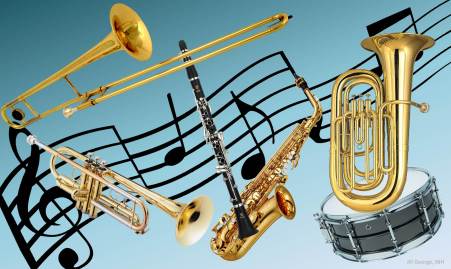Sound Advice: High School Music Training Sharpens Language Skills
 When children enter the first grade, their brains are primed for learning experiences, significantly more so, in fact, than adult brains. For instance, scientists have documented that musical training during grade school produces a signature set of benefits for the brain and for behavior—benefits that can last a lifetime, whether or not people continue to play music.
When children enter the first grade, their brains are primed for learning experiences, significantly more so, in fact, than adult brains. For instance, scientists have documented that musical training during grade school produces a signature set of benefits for the brain and for behavior—benefits that can last a lifetime, whether or not people continue to play music.Now, researchers at Northwestern University, Evanston, IL, have some good news for teenagers who missed out on learning to play musical instruments as young kids. Even when musical training isn’t started until high school, it produces meaningful changes in how the brain processes sound. And those changes have positive benefits not only for a teen’s musical abilities, but also for skills related to reading and writing.
To test the influence of musical training on the teenage brain, NIH-funded researchers, led by Nina Kraus, recruited 40 rising high school freshmen shortly before the school year started. As described in the journal Proceedings of the National Academy of Sciences [1], the students—none of whom had previous musical training—attended public schools in low-income neighborhoods in the Chicago area.
Half of the students chose to enroll in a high school band class, involving two to three hours per week of group instruction in instrumental music. The other half opted for a Junior Reserve Officers’ Training Corps (ROTC) program that focused on physical fitness.
The researchers tested the students’ neural responses to sound and their language skills, initially before they received musical or fitness training and then again in the summer preceding their senior year. Importantly, at entry into the study, the researchers found no difference between the groups in IQ, sex, age, or maternal education, which is a reflection of socioeconomic status. They also found no difference in neural or linguistic skills.
As Kraus explains in a fascinating video slideshow, the signals that the brain’s neurons fire off in response to sound look remarkably similar to the sound waves themselves. When you play those brain waves back, you can actually hear a recognizable version of whatever the person just heard, whether the music is heavy metal or Mozart!
During adolescence, researchers have found that the brain typically becomes less reliable in the way it responds to sound. (This finding probably comes as no great surprise to anyone who’s ever parented or taught teenagers.) However, the new study revealed that the brains of teens who took band classes displayed a more consistent, mature response to sound than the brains of those who took ROTC fitness classes. Now that’s really something, because the neural signals the researchers were measuring reflect an automatic brain response that a person can’t voluntarily control. Therefore, the results show that the brains of the students who received musical training were physically wired to process sound more efficiently than the brains of the students who received fitness training.
What’s more, the band students were better than the ROTC students at picking out speech sounds in spoken words. Kraus has shown in other studies, including a recent NIH-funded study in very young children reported in PLoS Biology [2], that the same brain measures of sound processing predict a child’s future reading skills. In other words, the brain response to sound predicts whether or not a pre-reader will struggle in literacy development. In older children, the brain response predicts if they’ve been diagnosed with a learning disability, suggesting a potential clinical use for the technology that Kraus and her team have developed.
Of course, none of this discounts the value of physical education. Students who took part in the ROTC fitness program surely saw benefits in other areas. Ideally, students should be exposed to both! Still, at a time when budget constraints may make it tempting to cut school music programs, this research serves as a reminder that, just as the rest of the body benefits from physical exercise, the brain has the potential to grow stronger with the right kind of mental workouts.
References:
[1] Music training alters the course of adolescent auditory development. Tierney AT, Krizman J, Kraus N. Proc Natl Acad Sci U S A. 2015 Jul 20. [Epub ahead of print]
[2] Auditory Processing in Noise: A Preschool Biomarker for Literacy. White-Schwoch T, Woodruff Carr K, Thompson EC, Anderson S, Nicol T, Bradlow AR, Zecker SG, Kraus N. PLoS Biol. 2015 Jul 14.
Links:
Brain Development During Childhood and Adolescence (National Institute of Mental Health/NIH)
Auditory Neuroscience Laboratory (Northwestern University, Evanston, IL)
NIH Support: National Institute on Deafness and Other Communication Disorders; Eunice Kennedy Shriver National Institute of Child Health and Human Development






















.png)











No hay comentarios:
Publicar un comentario